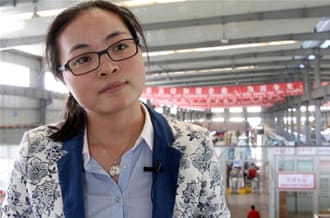Low wages have attracted foreign players to the poor African country, but labourers are hoping for better salaries.

Within a few years foreign companies have helped build up Ethiopia's nascent industry [Simona Foltyn/Al Jazeera]
|
|||||
|
Addis Ababa, Ethiopia - Lunch
break is over at the Huajian shoe factory and workers assemble in
perfectly aligned two-row formations, march, salute, and return back to
their work stations.
"Our
factory is a bit like a military organisation. The labour here is not
highly educated so we have to use a very simple way to communicate and
organise them," said Nara Zhou, Huajian's spokeswoman, as she walks through the aisles of the large factory hall.
Red
banners with writing in Chinese, Amharic and English hang from the
ceiling, bearing lofty slogans such as "China-Africa friendly and
harmonious enterprise, to win honour for the country", and "High level
of democracy".
They
are excerpts of speeches given by the company's president, Zhang Hua
Rong, a former military officer who established Huajian's operation in
Ethiopia in 2012, Zhou explained.
Within a few years, foreign companies such as Huajian have helped build up Ethiopia's nascent footwear industry from scratch.
Today,
the company employs about 3,000 workers in Ethiopia and generates $20m
worth of exports by producing shoes for international brands such as
Guess, Naturalizer and Toms destined for US and European markets.
With
a growing number of brands such as H&M starting to source from
Ethiopia and existing companies ramping up production capacity, the
three percent of Ethiopia's exports that came from textiles and leather
in 2013 may well double in the next couple of years, according to
government estimates.
Cheaper than Asia
Rising
production costs in Asia are the key drivers prompting manufacturers
such as Huajian to look for alternative production sites. Ethiopia seems
to be ticking many of the boxes for investors: abundant cheap labour,
no tariffs, and a stable political environment.
Entry-level salaries in Ethiopia range from $35 to $40 per month, significantly below average Chinese manufacturing wages of $629 per month, a figure reported to have tripled between 2000 and 2010.
In Bangladesh, textile workers are required to earn at least $68 per
month, which represents an increase in minimum wages following the
deadly collapse of a factory building in April, and criticism of working
conditions there.
Ethiopia, however, has no minimum wage except for public servants.
"We
do have a labour law in this country, which is in line with
international standards, but the government will not actually intervene
in setting the minimum wage," Aklilu Woldemariam, director of investment promotion at Ethiopia's Investment Agency, told Al Jazeera.
The absence of a minimum wage means that market dynamics determine the salaries of factory workers. With urban unemployment at about 18 percent, workers must often accept whatever wage is offered, or have no income at all.
"I
am happy I have a job but if I had an option, I wouldn't work for this
amount of money and under these conditions," said Meseret Asrat, a
24-year-old employee at Ayka Textiles in the capital Addis Ababa.
Asrat earns $41 per month after the factory's recent wage increase.
Struggle for workers' rights
Despite
demands for higher wages and better health and safety standards, Ayka
is considered a success story when it comes to workers' rights in
Ethiopia.
The
country's biggest garment exporter and an employer of 8,000 workers,
Ayka is also one of few textile and leather factories to have
established a functional trade union. "In the beginning it was difficult
to establish the union. The management didn't want the workers to unite
and speak with a common voice," said Mesfin Teshome, who leads Ayka's
trade union.
Following
pressure from Ayka's German client Tchibo and a change in the company's
management, the union won a 25-percent wage increase in a collective
bargaining agreement negotiated last year. But winning further salary
increases remains a challenge, Teshome said, partly because the
company's profits are not made public.
Although
Ethiopia's constitution guarantees workers the right to associate, most
factories, including Huajian, do not have trade unions.
"If
the business owners refuse, there is not much we can do," Angesom Gebre
Yohannes from the Industrial Federation of Ethiopian Textile, Leather
and Garment Worker Trade Unions, told Al Jazeera. "The law is there, but
the struggle to implement it is left up to us and the workers."
The
union currently employs four full-time staff and lacks the resources
and political weight to lobby big businesses, let alone take them to
court over alleged violations of wages and working conditions. Often,
pressure by foreign clients and consumers is the only way to ensure
better conditions for workers.
"Big foreign buyers, like in the case of Tchibo, can have a big contribution towards workers' rights," Yohannes said.
Invest now, worry later?
Between 2010 and 2014, Ethiopia's economy grew at an impressive 10.4 percent annual rate, driven mainly by large public expenditures under the umbrella of an ambitious Growth and Transformation Plan (GTP). The plan seeks to transform Ethiopia into a middle-income country by 2025.
As
part of the GTP, selected industries such as textiles and leather with
high-growth potential have been prioritised for foreign investment.
"This
is the formative stage of the manufacturing sector," said Dereje
Feyissa Dori, senior adviser and research professor at the International
Law and Policy Institute office in Addis Ababa. "Investors are charting
into new territories, so there must be something to entice them."
For that reason, the government is sceptical about introducing a minimum wage, which might scare away investors said Dori. Union representatives say monthly wages should be 2,000 birr ($100), twice as high as today's entry-level wages.
Low salaries are often attributed to relatively low productivity and cost of living. But for Ethiopia - a country where 29.6 percent of the population still
lives below the poverty line - a shift will be needed if it is to
become a middle-income country by 2025, as envisioned by the GTP.
"It's
not a question of if but when the government will approach investors to
discuss more corporate social responsibility," said Dori.
Trade
unions and some business owners say ensuring reasonable wages and
working conditions would make the industry more sustainable and avoid
disruptions further down the line.
"If
the government takes the necessary measures in the beginning, the
industry will not be disturbed later on like we see it in the
experiences of Far East Asia," Ercan Tukoglu, the general manager of
Ayka Textiles, told Al Jazeera.
|






